Business Law Assignment - Principles of Contract and Agency Law
VerifiedAdded on 2020/04/07
|7
|2363
|59
Homework Assignment
AI Summary
This business law assignment addresses key principles of contract and agency law. It begins by defining contracts and their essential elements, emphasizing the requirements for a valid contract, including offer, acceptance, intention, consideration, capacity, and free consent. The assignment then differentiates between written and oral contracts, discussing their enforceability and the challenges associated with proving the terms of oral agreements. It further explores the distinction between formal and informal contracts, providing examples of each and highlighting their legal implications. The assignment analyzes a scenario involving a social agreement, specifically a lottery ticket purchase among friends, to determine whether such agreements are legally enforceable. Finally, it explains the relationship between a principal and an agent, outlining the duties and obligations of both parties within an agency arrangement, including the concept of fiduciary duty and the agent's responsibility to act in the principal's best interest. The assignment is supported by relevant legal references.
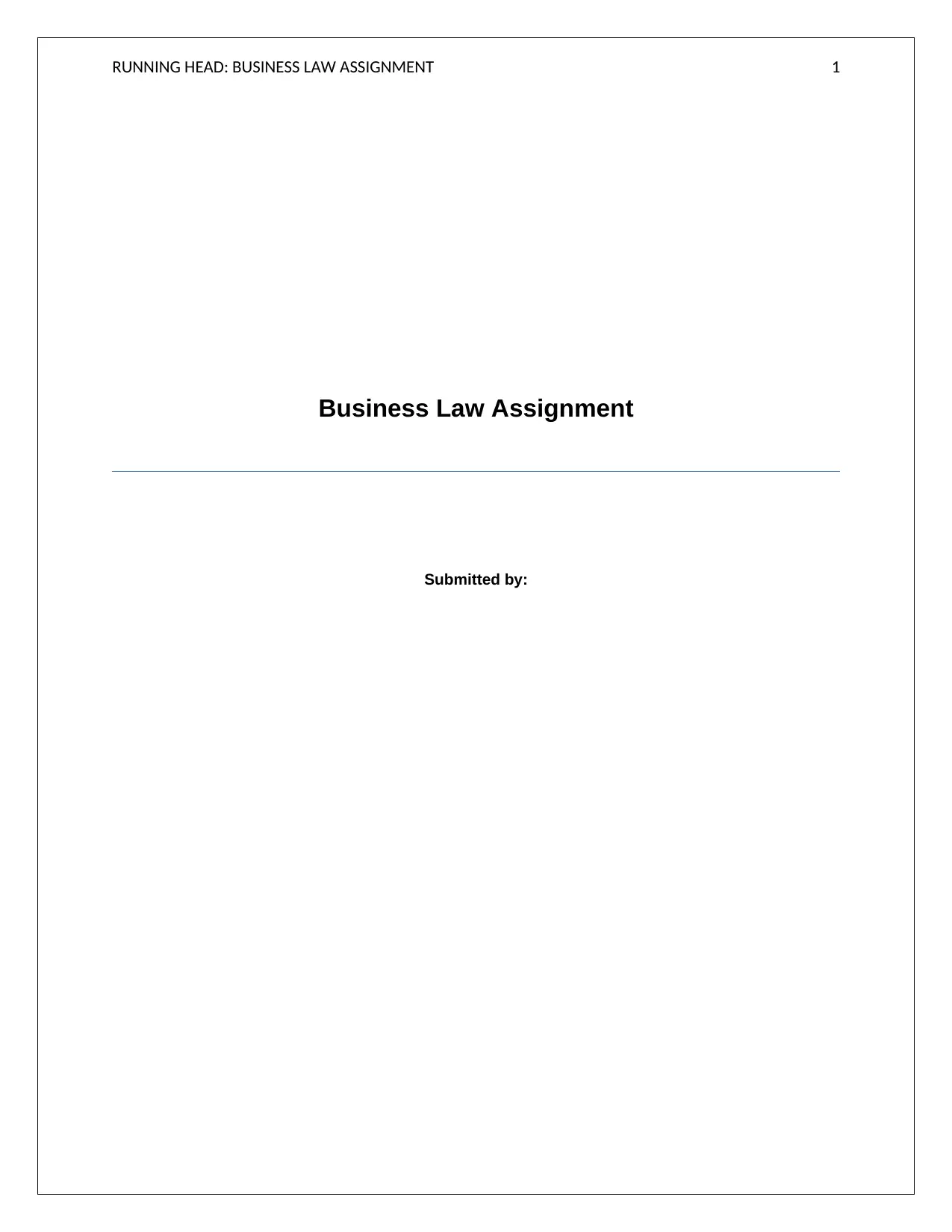
RUNNING HEAD: BUSINESS LAW ASSIGNMENT 1
Business Law Assignment
Submitted by:
Business Law Assignment
Submitted by:
Paraphrase This Document
Need a fresh take? Get an instant paraphrase of this document with our AI Paraphraser
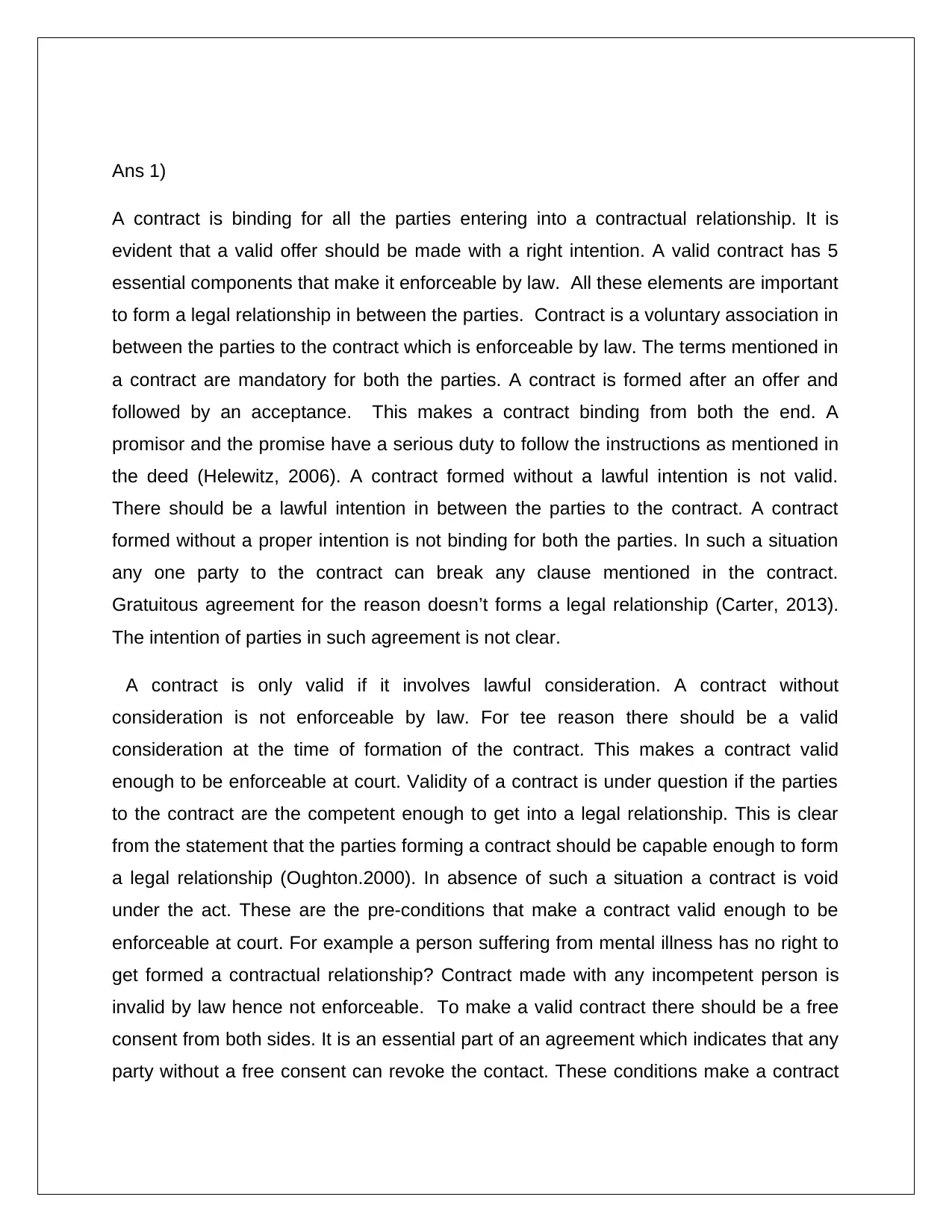
Ans 1)
A contract is binding for all the parties entering into a contractual relationship. It is
evident that a valid offer should be made with a right intention. A valid contract has 5
essential components that make it enforceable by law. All these elements are important
to form a legal relationship in between the parties. Contract is a voluntary association in
between the parties to the contract which is enforceable by law. The terms mentioned in
a contract are mandatory for both the parties. A contract is formed after an offer and
followed by an acceptance. This makes a contract binding from both the end. A
promisor and the promise have a serious duty to follow the instructions as mentioned in
the deed (Helewitz, 2006). A contract formed without a lawful intention is not valid.
There should be a lawful intention in between the parties to the contract. A contract
formed without a proper intention is not binding for both the parties. In such a situation
any one party to the contract can break any clause mentioned in the contract.
Gratuitous agreement for the reason doesn’t forms a legal relationship (Carter, 2013).
The intention of parties in such agreement is not clear.
A contract is only valid if it involves lawful consideration. A contract without
consideration is not enforceable by law. For tee reason there should be a valid
consideration at the time of formation of the contract. This makes a contract valid
enough to be enforceable at court. Validity of a contract is under question if the parties
to the contract are the competent enough to get into a legal relationship. This is clear
from the statement that the parties forming a contract should be capable enough to form
a legal relationship (Oughton.2000). In absence of such a situation a contract is void
under the act. These are the pre-conditions that make a contract valid enough to be
enforceable at court. For example a person suffering from mental illness has no right to
get formed a contractual relationship? Contract made with any incompetent person is
invalid by law hence not enforceable. To make a valid contract there should be a free
consent from both sides. It is an essential part of an agreement which indicates that any
party without a free consent can revoke the contact. These conditions make a contract
A contract is binding for all the parties entering into a contractual relationship. It is
evident that a valid offer should be made with a right intention. A valid contract has 5
essential components that make it enforceable by law. All these elements are important
to form a legal relationship in between the parties. Contract is a voluntary association in
between the parties to the contract which is enforceable by law. The terms mentioned in
a contract are mandatory for both the parties. A contract is formed after an offer and
followed by an acceptance. This makes a contract binding from both the end. A
promisor and the promise have a serious duty to follow the instructions as mentioned in
the deed (Helewitz, 2006). A contract formed without a lawful intention is not valid.
There should be a lawful intention in between the parties to the contract. A contract
formed without a proper intention is not binding for both the parties. In such a situation
any one party to the contract can break any clause mentioned in the contract.
Gratuitous agreement for the reason doesn’t forms a legal relationship (Carter, 2013).
The intention of parties in such agreement is not clear.
A contract is only valid if it involves lawful consideration. A contract without
consideration is not enforceable by law. For tee reason there should be a valid
consideration at the time of formation of the contract. This makes a contract valid
enough to be enforceable at court. Validity of a contract is under question if the parties
to the contract are the competent enough to get into a legal relationship. This is clear
from the statement that the parties forming a contract should be capable enough to form
a legal relationship (Oughton.2000). In absence of such a situation a contract is void
under the act. These are the pre-conditions that make a contract valid enough to be
enforceable at court. For example a person suffering from mental illness has no right to
get formed a contractual relationship? Contract made with any incompetent person is
invalid by law hence not enforceable. To make a valid contract there should be a free
consent from both sides. It is an essential part of an agreement which indicates that any
party without a free consent can revoke the contact. These conditions make a contract
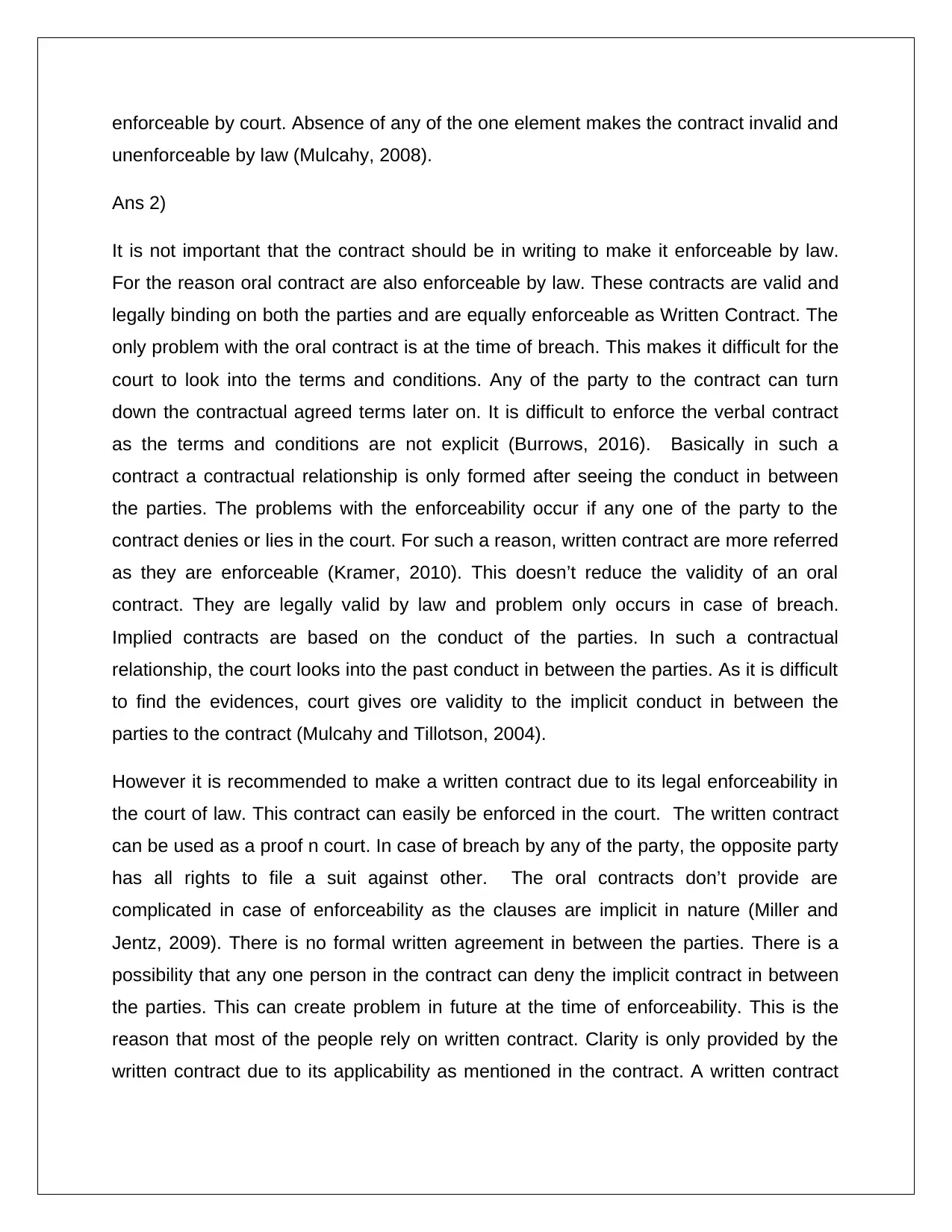
enforceable by court. Absence of any of the one element makes the contract invalid and
unenforceable by law (Mulcahy, 2008).
Ans 2)
It is not important that the contract should be in writing to make it enforceable by law.
For the reason oral contract are also enforceable by law. These contracts are valid and
legally binding on both the parties and are equally enforceable as Written Contract. The
only problem with the oral contract is at the time of breach. This makes it difficult for the
court to look into the terms and conditions. Any of the party to the contract can turn
down the contractual agreed terms later on. It is difficult to enforce the verbal contract
as the terms and conditions are not explicit (Burrows, 2016). Basically in such a
contract a contractual relationship is only formed after seeing the conduct in between
the parties. The problems with the enforceability occur if any one of the party to the
contract denies or lies in the court. For such a reason, written contract are more referred
as they are enforceable (Kramer, 2010). This doesn’t reduce the validity of an oral
contract. They are legally valid by law and problem only occurs in case of breach.
Implied contracts are based on the conduct of the parties. In such a contractual
relationship, the court looks into the past conduct in between the parties. As it is difficult
to find the evidences, court gives ore validity to the implicit conduct in between the
parties to the contract (Mulcahy and Tillotson, 2004).
However it is recommended to make a written contract due to its legal enforceability in
the court of law. This contract can easily be enforced in the court. The written contract
can be used as a proof n court. In case of breach by any of the party, the opposite party
has all rights to file a suit against other. The oral contracts don’t provide are
complicated in case of enforceability as the clauses are implicit in nature (Miller and
Jentz, 2009). There is no formal written agreement in between the parties. There is a
possibility that any one person in the contract can deny the implicit contract in between
the parties. This can create problem in future at the time of enforceability. This is the
reason that most of the people rely on written contract. Clarity is only provided by the
written contract due to its applicability as mentioned in the contract. A written contract
unenforceable by law (Mulcahy, 2008).
Ans 2)
It is not important that the contract should be in writing to make it enforceable by law.
For the reason oral contract are also enforceable by law. These contracts are valid and
legally binding on both the parties and are equally enforceable as Written Contract. The
only problem with the oral contract is at the time of breach. This makes it difficult for the
court to look into the terms and conditions. Any of the party to the contract can turn
down the contractual agreed terms later on. It is difficult to enforce the verbal contract
as the terms and conditions are not explicit (Burrows, 2016). Basically in such a
contract a contractual relationship is only formed after seeing the conduct in between
the parties. The problems with the enforceability occur if any one of the party to the
contract denies or lies in the court. For such a reason, written contract are more referred
as they are enforceable (Kramer, 2010). This doesn’t reduce the validity of an oral
contract. They are legally valid by law and problem only occurs in case of breach.
Implied contracts are based on the conduct of the parties. In such a contractual
relationship, the court looks into the past conduct in between the parties. As it is difficult
to find the evidences, court gives ore validity to the implicit conduct in between the
parties to the contract (Mulcahy and Tillotson, 2004).
However it is recommended to make a written contract due to its legal enforceability in
the court of law. This contract can easily be enforced in the court. The written contract
can be used as a proof n court. In case of breach by any of the party, the opposite party
has all rights to file a suit against other. The oral contracts don’t provide are
complicated in case of enforceability as the clauses are implicit in nature (Miller and
Jentz, 2009). There is no formal written agreement in between the parties. There is a
possibility that any one person in the contract can deny the implicit contract in between
the parties. This can create problem in future at the time of enforceability. This is the
reason that most of the people rely on written contract. Clarity is only provided by the
written contract due to its applicability as mentioned in the contract. A written contract
⊘ This is a preview!⊘
Do you want full access?
Subscribe today to unlock all pages.

Trusted by 1+ million students worldwide
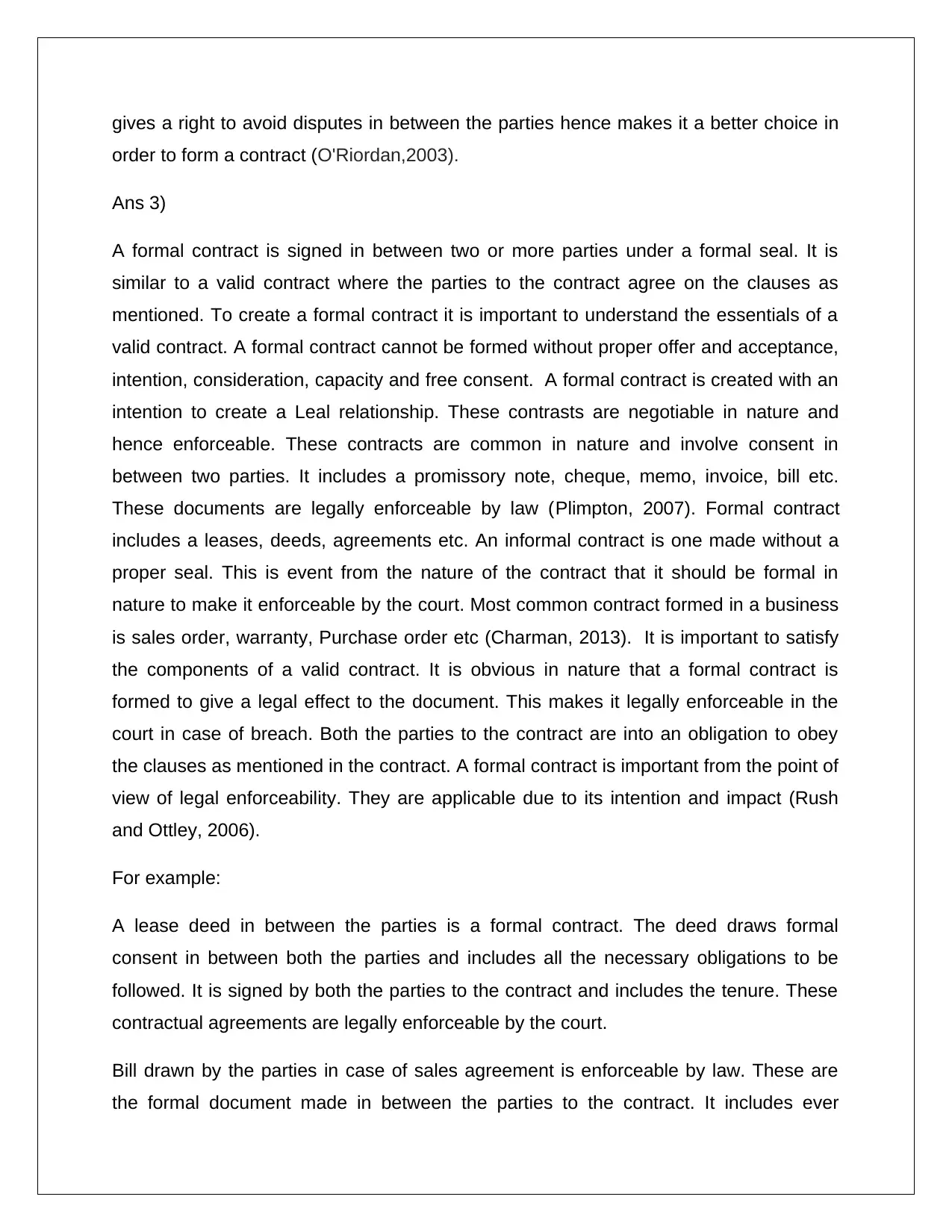
gives a right to avoid disputes in between the parties hence makes it a better choice in
order to form a contract (O'Riordan,2003).
Ans 3)
A formal contract is signed in between two or more parties under a formal seal. It is
similar to a valid contract where the parties to the contract agree on the clauses as
mentioned. To create a formal contract it is important to understand the essentials of a
valid contract. A formal contract cannot be formed without proper offer and acceptance,
intention, consideration, capacity and free consent. A formal contract is created with an
intention to create a Leal relationship. These contrasts are negotiable in nature and
hence enforceable. These contracts are common in nature and involve consent in
between two parties. It includes a promissory note, cheque, memo, invoice, bill etc.
These documents are legally enforceable by law (Plimpton, 2007). Formal contract
includes a leases, deeds, agreements etc. An informal contract is one made without a
proper seal. This is event from the nature of the contract that it should be formal in
nature to make it enforceable by the court. Most common contract formed in a business
is sales order, warranty, Purchase order etc (Charman, 2013). It is important to satisfy
the components of a valid contract. It is obvious in nature that a formal contract is
formed to give a legal effect to the document. This makes it legally enforceable in the
court in case of breach. Both the parties to the contract are into an obligation to obey
the clauses as mentioned in the contract. A formal contract is important from the point of
view of legal enforceability. They are applicable due to its intention and impact (Rush
and Ottley, 2006).
For example:
A lease deed in between the parties is a formal contract. The deed draws formal
consent in between both the parties and includes all the necessary obligations to be
followed. It is signed by both the parties to the contract and includes the tenure. These
contractual agreements are legally enforceable by the court.
Bill drawn by the parties in case of sales agreement is enforceable by law. These are
the formal document made in between the parties to the contract. It includes ever
order to form a contract (O'Riordan,2003).
Ans 3)
A formal contract is signed in between two or more parties under a formal seal. It is
similar to a valid contract where the parties to the contract agree on the clauses as
mentioned. To create a formal contract it is important to understand the essentials of a
valid contract. A formal contract cannot be formed without proper offer and acceptance,
intention, consideration, capacity and free consent. A formal contract is created with an
intention to create a Leal relationship. These contrasts are negotiable in nature and
hence enforceable. These contracts are common in nature and involve consent in
between two parties. It includes a promissory note, cheque, memo, invoice, bill etc.
These documents are legally enforceable by law (Plimpton, 2007). Formal contract
includes a leases, deeds, agreements etc. An informal contract is one made without a
proper seal. This is event from the nature of the contract that it should be formal in
nature to make it enforceable by the court. Most common contract formed in a business
is sales order, warranty, Purchase order etc (Charman, 2013). It is important to satisfy
the components of a valid contract. It is obvious in nature that a formal contract is
formed to give a legal effect to the document. This makes it legally enforceable in the
court in case of breach. Both the parties to the contract are into an obligation to obey
the clauses as mentioned in the contract. A formal contract is important from the point of
view of legal enforceability. They are applicable due to its intention and impact (Rush
and Ottley, 2006).
For example:
A lease deed in between the parties is a formal contract. The deed draws formal
consent in between both the parties and includes all the necessary obligations to be
followed. It is signed by both the parties to the contract and includes the tenure. These
contractual agreements are legally enforceable by the court.
Bill drawn by the parties in case of sales agreement is enforceable by law. These are
the formal document made in between the parties to the contract. It includes ever
Paraphrase This Document
Need a fresh take? Get an instant paraphrase of this document with our AI Paraphraser
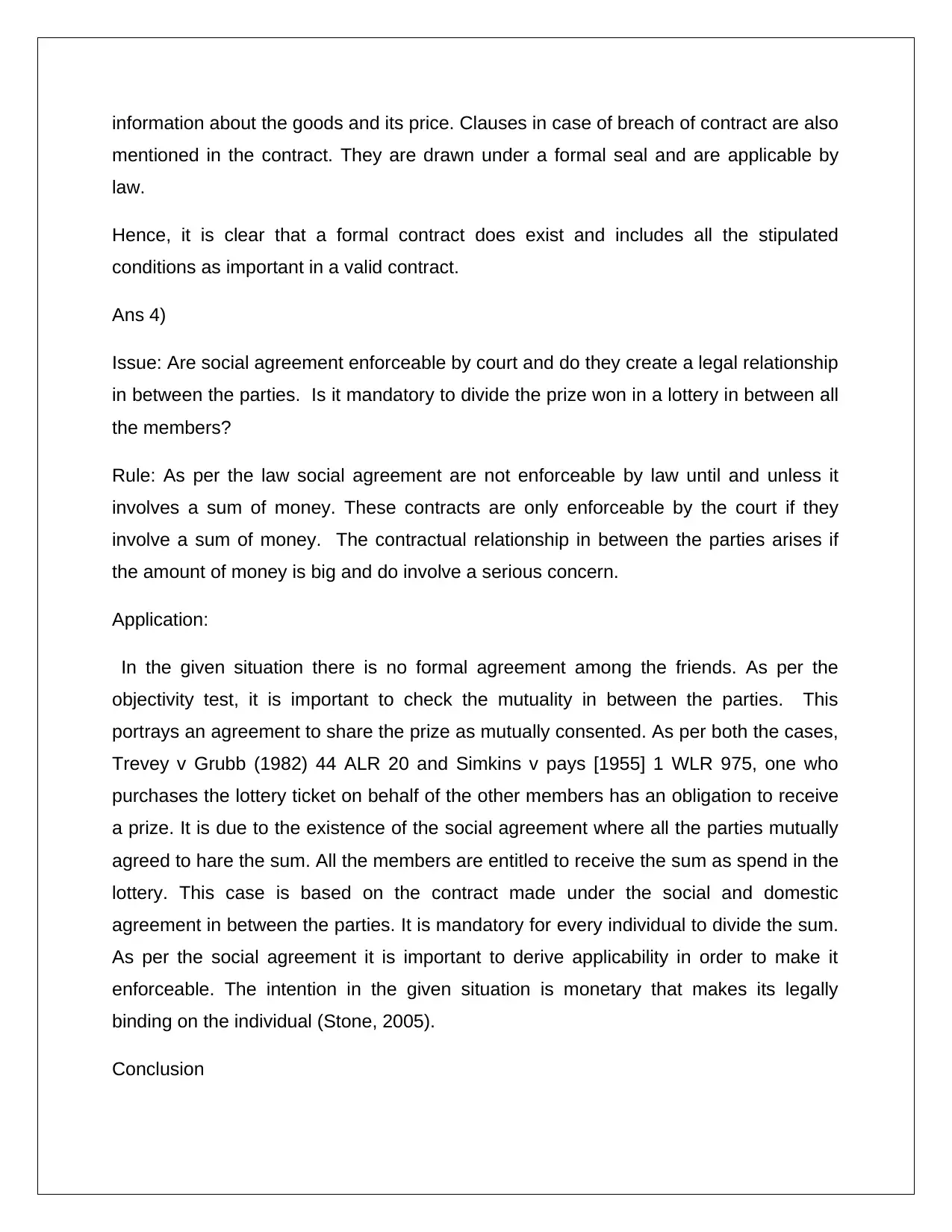
information about the goods and its price. Clauses in case of breach of contract are also
mentioned in the contract. They are drawn under a formal seal and are applicable by
law.
Hence, it is clear that a formal contract does exist and includes all the stipulated
conditions as important in a valid contract.
Ans 4)
Issue: Are social agreement enforceable by court and do they create a legal relationship
in between the parties. Is it mandatory to divide the prize won in a lottery in between all
the members?
Rule: As per the law social agreement are not enforceable by law until and unless it
involves a sum of money. These contracts are only enforceable by the court if they
involve a sum of money. The contractual relationship in between the parties arises if
the amount of money is big and do involve a serious concern.
Application:
In the given situation there is no formal agreement among the friends. As per the
objectivity test, it is important to check the mutuality in between the parties. This
portrays an agreement to share the prize as mutually consented. As per both the cases,
Trevey v Grubb (1982) 44 ALR 20 and Simkins v pays [1955] 1 WLR 975, one who
purchases the lottery ticket on behalf of the other members has an obligation to receive
a prize. It is due to the existence of the social agreement where all the parties mutually
agreed to hare the sum. All the members are entitled to receive the sum as spend in the
lottery. This case is based on the contract made under the social and domestic
agreement in between the parties. It is mandatory for every individual to divide the sum.
As per the social agreement it is important to derive applicability in order to make it
enforceable. The intention in the given situation is monetary that makes its legally
binding on the individual (Stone, 2005).
Conclusion
mentioned in the contract. They are drawn under a formal seal and are applicable by
law.
Hence, it is clear that a formal contract does exist and includes all the stipulated
conditions as important in a valid contract.
Ans 4)
Issue: Are social agreement enforceable by court and do they create a legal relationship
in between the parties. Is it mandatory to divide the prize won in a lottery in between all
the members?
Rule: As per the law social agreement are not enforceable by law until and unless it
involves a sum of money. These contracts are only enforceable by the court if they
involve a sum of money. The contractual relationship in between the parties arises if
the amount of money is big and do involve a serious concern.
Application:
In the given situation there is no formal agreement among the friends. As per the
objectivity test, it is important to check the mutuality in between the parties. This
portrays an agreement to share the prize as mutually consented. As per both the cases,
Trevey v Grubb (1982) 44 ALR 20 and Simkins v pays [1955] 1 WLR 975, one who
purchases the lottery ticket on behalf of the other members has an obligation to receive
a prize. It is due to the existence of the social agreement where all the parties mutually
agreed to hare the sum. All the members are entitled to receive the sum as spend in the
lottery. This case is based on the contract made under the social and domestic
agreement in between the parties. It is mandatory for every individual to divide the sum.
As per the social agreement it is important to derive applicability in order to make it
enforceable. The intention in the given situation is monetary that makes its legally
binding on the individual (Stone, 2005).
Conclusion
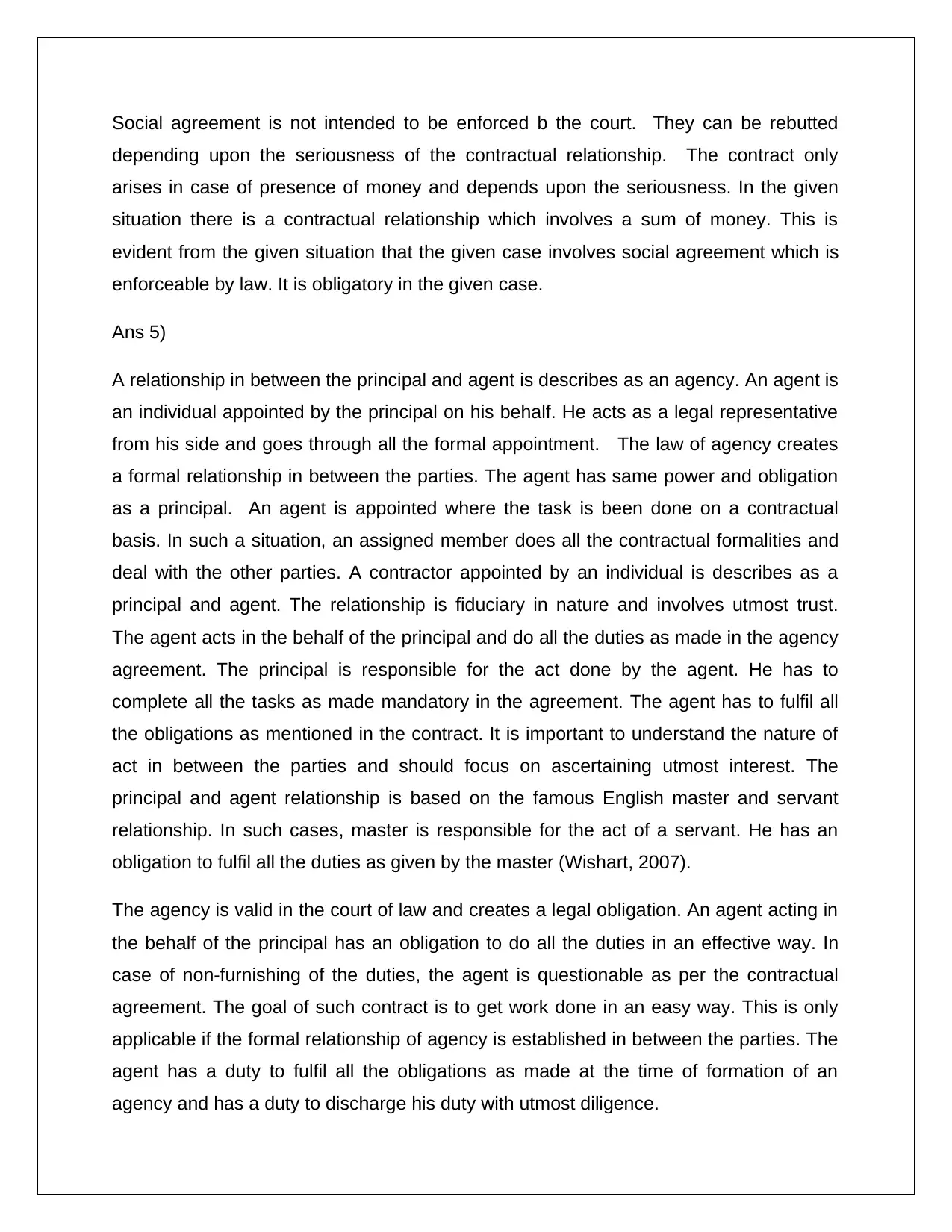
Social agreement is not intended to be enforced b the court. They can be rebutted
depending upon the seriousness of the contractual relationship. The contract only
arises in case of presence of money and depends upon the seriousness. In the given
situation there is a contractual relationship which involves a sum of money. This is
evident from the given situation that the given case involves social agreement which is
enforceable by law. It is obligatory in the given case.
Ans 5)
A relationship in between the principal and agent is describes as an agency. An agent is
an individual appointed by the principal on his behalf. He acts as a legal representative
from his side and goes through all the formal appointment. The law of agency creates
a formal relationship in between the parties. The agent has same power and obligation
as a principal. An agent is appointed where the task is been done on a contractual
basis. In such a situation, an assigned member does all the contractual formalities and
deal with the other parties. A contractor appointed by an individual is describes as a
principal and agent. The relationship is fiduciary in nature and involves utmost trust.
The agent acts in the behalf of the principal and do all the duties as made in the agency
agreement. The principal is responsible for the act done by the agent. He has to
complete all the tasks as made mandatory in the agreement. The agent has to fulfil all
the obligations as mentioned in the contract. It is important to understand the nature of
act in between the parties and should focus on ascertaining utmost interest. The
principal and agent relationship is based on the famous English master and servant
relationship. In such cases, master is responsible for the act of a servant. He has an
obligation to fulfil all the duties as given by the master (Wishart, 2007).
The agency is valid in the court of law and creates a legal obligation. An agent acting in
the behalf of the principal has an obligation to do all the duties in an effective way. In
case of non-furnishing of the duties, the agent is questionable as per the contractual
agreement. The goal of such contract is to get work done in an easy way. This is only
applicable if the formal relationship of agency is established in between the parties. The
agent has a duty to fulfil all the obligations as made at the time of formation of an
agency and has a duty to discharge his duty with utmost diligence.
depending upon the seriousness of the contractual relationship. The contract only
arises in case of presence of money and depends upon the seriousness. In the given
situation there is a contractual relationship which involves a sum of money. This is
evident from the given situation that the given case involves social agreement which is
enforceable by law. It is obligatory in the given case.
Ans 5)
A relationship in between the principal and agent is describes as an agency. An agent is
an individual appointed by the principal on his behalf. He acts as a legal representative
from his side and goes through all the formal appointment. The law of agency creates
a formal relationship in between the parties. The agent has same power and obligation
as a principal. An agent is appointed where the task is been done on a contractual
basis. In such a situation, an assigned member does all the contractual formalities and
deal with the other parties. A contractor appointed by an individual is describes as a
principal and agent. The relationship is fiduciary in nature and involves utmost trust.
The agent acts in the behalf of the principal and do all the duties as made in the agency
agreement. The principal is responsible for the act done by the agent. He has to
complete all the tasks as made mandatory in the agreement. The agent has to fulfil all
the obligations as mentioned in the contract. It is important to understand the nature of
act in between the parties and should focus on ascertaining utmost interest. The
principal and agent relationship is based on the famous English master and servant
relationship. In such cases, master is responsible for the act of a servant. He has an
obligation to fulfil all the duties as given by the master (Wishart, 2007).
The agency is valid in the court of law and creates a legal obligation. An agent acting in
the behalf of the principal has an obligation to do all the duties in an effective way. In
case of non-furnishing of the duties, the agent is questionable as per the contractual
agreement. The goal of such contract is to get work done in an easy way. This is only
applicable if the formal relationship of agency is established in between the parties. The
agent has a duty to fulfil all the obligations as made at the time of formation of an
agency and has a duty to discharge his duty with utmost diligence.
⊘ This is a preview!⊘
Do you want full access?
Subscribe today to unlock all pages.

Trusted by 1+ million students worldwide
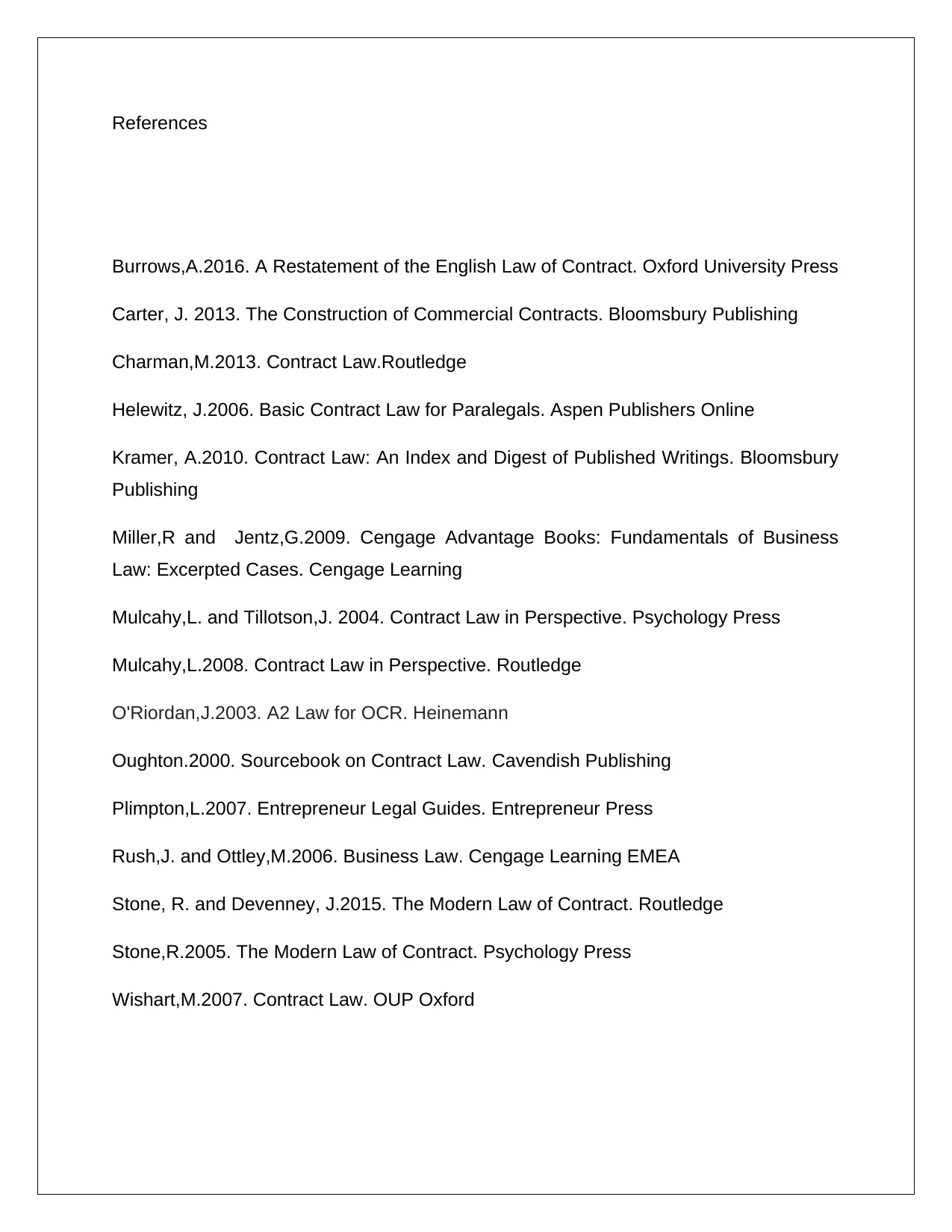
References
Burrows,A.2016. A Restatement of the English Law of Contract. Oxford University Press
Carter, J. 2013. The Construction of Commercial Contracts. Bloomsbury Publishing
Charman,M.2013. Contract Law.Routledge
Helewitz, J.2006. Basic Contract Law for Paralegals. Aspen Publishers Online
Kramer, A.2010. Contract Law: An Index and Digest of Published Writings. Bloomsbury
Publishing
Miller,R and Jentz,G.2009. Cengage Advantage Books: Fundamentals of Business
Law: Excerpted Cases. Cengage Learning
Mulcahy,L. and Tillotson,J. 2004. Contract Law in Perspective. Psychology Press
Mulcahy,L.2008. Contract Law in Perspective. Routledge
O'Riordan,J.2003. A2 Law for OCR. Heinemann
Oughton.2000. Sourcebook on Contract Law. Cavendish Publishing
Plimpton,L.2007. Entrepreneur Legal Guides. Entrepreneur Press
Rush,J. and Ottley,M.2006. Business Law. Cengage Learning EMEA
Stone, R. and Devenney, J.2015. The Modern Law of Contract. Routledge
Stone,R.2005. The Modern Law of Contract. Psychology Press
Wishart,M.2007. Contract Law. OUP Oxford
Burrows,A.2016. A Restatement of the English Law of Contract. Oxford University Press
Carter, J. 2013. The Construction of Commercial Contracts. Bloomsbury Publishing
Charman,M.2013. Contract Law.Routledge
Helewitz, J.2006. Basic Contract Law for Paralegals. Aspen Publishers Online
Kramer, A.2010. Contract Law: An Index and Digest of Published Writings. Bloomsbury
Publishing
Miller,R and Jentz,G.2009. Cengage Advantage Books: Fundamentals of Business
Law: Excerpted Cases. Cengage Learning
Mulcahy,L. and Tillotson,J. 2004. Contract Law in Perspective. Psychology Press
Mulcahy,L.2008. Contract Law in Perspective. Routledge
O'Riordan,J.2003. A2 Law for OCR. Heinemann
Oughton.2000. Sourcebook on Contract Law. Cavendish Publishing
Plimpton,L.2007. Entrepreneur Legal Guides. Entrepreneur Press
Rush,J. and Ottley,M.2006. Business Law. Cengage Learning EMEA
Stone, R. and Devenney, J.2015. The Modern Law of Contract. Routledge
Stone,R.2005. The Modern Law of Contract. Psychology Press
Wishart,M.2007. Contract Law. OUP Oxford
1 out of 7
Related Documents
Your All-in-One AI-Powered Toolkit for Academic Success.
+13062052269
info@desklib.com
Available 24*7 on WhatsApp / Email
![[object Object]](/_next/static/media/star-bottom.7253800d.svg)
Unlock your academic potential
Copyright © 2020–2026 A2Z Services. All Rights Reserved. Developed and managed by ZUCOL.





